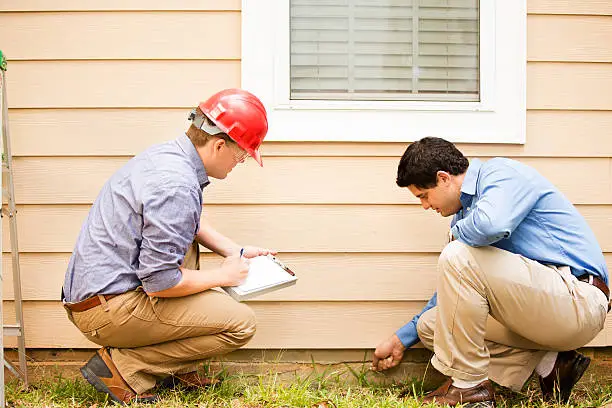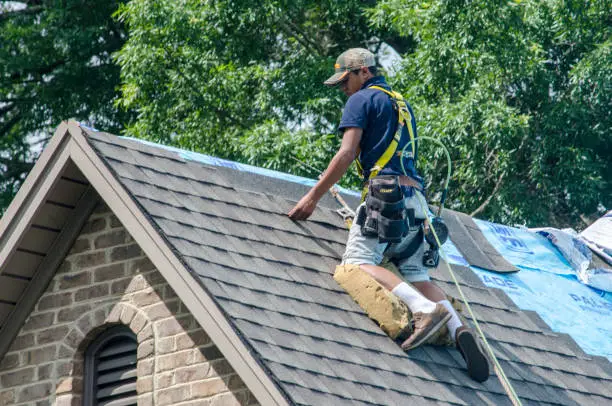Things That Fail a Home Inspection

Navigating the real estate world can often feel like a complex maze. One of the most important, yet frequently misunderstood steps in the process, is the home inspection. Before you jump to conclusions, let’s demystify what it truly means for a house to “fail” a home inspection and the implications it can have on your sale.
When you think about selling a property, the last thing you want is unexpected surprises, especially from a home inspection report. These reports can uncover major issues, ranging from structural damage, previous fire damage, to electrical systems mishaps. These problems can halt or significantly delay the sale, causing both the seller and the potential buyer unnecessary stress. If you’ve ever thought, “I wish I could just sell my house fast without these complications,” you’re not alone.
Enter R&H Distressed Properties. For those thinking, “I need to sell my house fast,” our team is your beacon of hope. We buy houses in any condition. Whether it’s in pristine shape or might not meet every standard in a rigorous home inspection, we’re here to simplify the process for you. Why wade through the complexities of real estate transactions when there’s a straightforward solution? Stay with us as we delve into the intricacies of home inspections, uncovering what could go wrong, and presenting an alternative route for those seeking an uncomplicated sale.
Understanding Home Inspections: More Than Just a Checklist
At its core, a home inspection is a comprehensive evaluation of a property’s visible and accessible systems. But it’s not just about ticking off boxes or looking for flaws. It’s about ensuring safety, understanding potential financial setbacks, and making informed decisions in a real estate transaction.
What Exactly is a Home Inspection?
Before any property changes hands, a home inspection is typically performed to protect both buyers and sellers. For the buyer, it gives insight into the house’s condition and potential problems. For the seller, it can offer a chance to make necessary repairs, ensuring a smoother sale.
The Role of the Home Inspector
A certified home inspector is trained to evaluate various parts of a house, from its foundation to its roof. Their main goal is to identify safety issues, major problems, and potential future concerns. After their evaluation, they provide a detailed home inspection report, offering an objective view of the property’s condition. It’s crucial to remember that home inspectors are neutral. They don’t work for the buyer or the seller; their allegiance is to the house’s integrity.
Minor Repairs Vs. Major Issues on the Inspection Report
While a home inspection report can seem daunting at first glance, not everything noted is a deal-breaker. The report might list minor repairs, such as cosmetic issues or aging appliances, which are easy fixes. However, it’s the major issues—like foundation problems, roofing issues, and faulty electrical systems—that can complicate the sale.
But don’t let the possibility of facing a “house fails inspection” scenario deter you from the process. Every property has its quirks. By understanding what home inspections entail and being prepared for potential outcomes, sellers can navigate the situation with confidence. And for those looking to bypass these complexities altogether, remember, there are alternatives. Cash house buyers like R&H Distressed Properties offer a streamlined option, ensuring you can sell your house without getting bogged down by the details.
In the sections to follow, we’ll delve deeper into the common issues that may arise during home inspections and offer guidance on how to approach them, ensuring you’re well-equipped, no matter the scenario.
Common Issues Found During Home Inspections: Potential Deal Breakers and Fixes

A house, much like any other long-standing structure, can develop issues over time. Home inspections are designed to uncover these issues, ensuring the safety and longevity of the residence. Let’s delve into some of the most common challenges that might emerge during a home inspection.
- Foundation Problems:
- Cracked Foundation: A severe crack can indicate structural damage which might cost tens of thousands to repair.
- Foundation Issues: Horizontal cracks, poor drainage systems, and other exterior foundation damages can be indicative of larger concerns.
- Foundation Damage: Continuous exposure to moisture can lead to a weakening of the base, leading to long-term stability concerns.
- Roofing Issues:
- Damaged Shingles: Not only an aesthetic concern but can lead to water leakage, causing mildew or more extensive structural damage.
- Roofing Problems: Blocked water drainage, termite infestation, and rotting wood can compromise a roof’s integrity.
- Electrical Systems:
- Electrical Problems: Outdated electrical panels, faulty wiring, and code violations can not only hamper the efficiency but also pose a fire hazard.
- Safety Concerns: A lack of functional carbon monoxide detectors, smoke detectors, and blocked chimneys can pose grave dangers.
- Lead and Other Hazardous Materials:
- Presence of Lead: Older homes might contain lead paint or lead-based paint which poses health risks, especially for children.
- Spray on Surfacing Materials: Some older insulation methods, like asbestos, can be harmful if disturbed.
- Structural Damages:
- Rotting Wood: Particularly common in homes with poor ventilation or water leakages, leading to potential long-term damage.
- Structural Damage: Ongoing water damage, termite infestations, or poor building materials can jeopardize a home’s structural integrity.
- Plumbing Issues:
- Leaky Pipes: Over time, these can lead to mold, structural damage, and even foundation problems.
- Water Heaters: Malfunctioning units can result in energy inefficiencies or even carbon monoxide poisoning.
- Pest Infestations:
- Termite Damage: Termites can silently erode a home’s structure, leading to expensive repair or replacement needs.
- Pest Problems: Other infestations, such as rodents, can harm a home’s wiring, plumbing, and more.
- HVAC Issues:
- Damaged Heat Exchangers: Can lead to ineffective heating and potential carbon monoxide leaks.
- HVAC Malfunctions: Regular maintenance is key, as major problems can be costly and reduce a home’s overall efficiency.
Facing these issues head-on is crucial. Not every finding on a home inspection report means the end of a potential deal. However, understanding and addressing these concerns ensures the property’s longevity, safety, and overall value. Remember, if the thought of addressing these issues feels overwhelming, companies like R&H Distressed Properties are always ready to step in. They often think, “We buy houses, no matter their condition.” So, for those seeking an expedited sale without the repair headaches, they present an attractive option.
What Happens When a House Fails Inspection: The Next Steps and Options
The phrase “fails a home inspection” can sound alarming, but it’s important to note that a home inspection isn’t a pass/fail exam. Instead, it provides a detailed account of a property’s condition. When issues arise from the home inspection report, it can lead to negotiations, delays, or even a buyer backing out of the deal. Let’s break down the potential scenarios and how to navigate them:
- Negotiations and Requested Repairs:
- After receiving the home inspection report, potential buyers may request repairs or ask for a repair credit on the purchase price. The buyer and seller, usually with the assistance of their real estate agents, will then discuss what reasonable repairs should be made.
- Sellers might agree to some or all of the requested repairs or opt for a price reduction in lieu of repairs.
- Home Inspection Contingencies:
- Many purchase agreements have a home inspection contingency clause. This allows the buyer to back out of the deal if the home inspection report reveals major problems and the two parties can’t come to an agreement on repairs or price adjustments.
- If the buyer backs out due to the home inspection report contingency, they usually get their earnest money returned, depending on the contract’s terms.
- Dealing with Major Issues:
- For severe concerns like foundation damage or safety issues from electrical systems, the buyer might request substantial reductions in price or demand repairs before proceeding.
- At times, these major issues can result in the deal falling apart, especially if the costs of repairs are high or if the buyer gets cold feet.
- Seller’s Response:
- Some sellers might decide to make repairs to enhance the property’s appeal and ensure future inspections don’t yield the same results.
- Others might adjust their price to reflect the property’s condition.
- In cases where repairs are extensive and time-consuming, sellers might consider selling to cash house buyers, like R&H Distressed Properties, who often say, “We buy ugly houses,” eliminating the need for extensive repairs.
- Choosing the Cash Buyer Route:
- When a seller thinks, “How can I sell my house fast without diving deep into repairs?” cash buyers emerge as an ideal solution. They buy houses in their existing condition, offering a quick and hassle-free sale.
- The advantage here is the immediacy and the assurance of a sale, even if a home inspection has revealed numerous problems.
While the initial shock of a less-than-ideal home inspection report can be stressful, options are always available. Whether it’s negotiating for repairs, adjusting the property’s price, or opting for cash house buyers like R&H Distressed Properties, there’s a pathway forward for every seller.
Addressing Problems Post Home Inspection Report: Strategies for a Smooth Sale

Discovering issues through a home inspection can be daunting for sellers. However, it’s not the end of the road. Addressing these issues promptly and strategically can pave the way for a successful sale. Let’s explore some proactive steps you can take after receiving the home inspection report:
- Evaluate and Prioritize:
- Once you receive the home inspection report, work with your real estate agent to categorize the problems. Identify which are safety concerns, major problems, or minor repairs.
- Prioritizing helps in understanding which issues need immediate attention and which can be negotiated with potential buyers.
- Seek Expert Opinions:
- For major issues like foundation problems or electrical problems, consult professionals. Getting an expert’s perspective helps in understanding the gravity of the issue and estimating repair costs.
- Tackle Safety Concerns First:
- Address safety issues like malfunctioning smoke detectors, carbon monoxide detectors, and blocked chimneys immediately. These are often non-negotiable for buyers and can be relatively straightforward to fix.
- Consider Offering Repair Credits:
- If certain repairs are too time-consuming or costly, consider offering repair credits to the buyer. This means reducing the purchase price, allowing the buyer to handle the repairs after the sale.
- Re-Negotiate with Potential Buyers:
- Engage in an open dialogue with potential buyers about the findings. Honest communication can lead to collaborative solutions, whether it’s adjusting the purchase price or agreeing on a timeline for repairs.
- Explore Home Warranty Options:
- Offering a home warranty can provide buyers with peace of mind. It ensures that if specific covered issues arise after the sale, they may be repaired at a reduced cost.
- Reassess Property Pricing:
- If the home inspection report uncovers major issues that are not feasible to address immediately, consider adjusting the property’s listing price to appeal to buyers who might be willing to take on repairs.
- Consider Alternative Selling Options:
- If the thought of managing repairs feels overwhelming or if negotiations reach an impasse, remember, there’s always an alternative. Cash house buyers like R&H Distressed Properties specialize in purchasing properties as-is. When you think, “I need to sell my house fast without getting into the nitty-gritty of repairs,” such buyers are an excellent solution.
In conclusion, while a challenging home inspection report can feel like a setback, it’s an opportunity to address issues and present a better, safer property to buyers. With the right approach and flexibility, you can navigate post-inspection hurdles and ensure a smooth real estate transaction.
Benefits of Selling to a Cash House Buyer Like R&H Distressed Properties: The Hassle-Free Route

For many sellers, traditional real estate transactions, with their myriad of potential hurdles, can seem daunting. From home inspections to time-consuming repairs and lengthy negotiations, the process can be strenuous. That’s where cash house buyers, such as R&H Distressed Properties, come into play. Let’s dive into the many advantages of choosing this alternative route:
- Immediate Offers:
- One of the significant benefits of cash house buyers is the speed of their offers. No more waiting for potential buyers to visit, or for their mortgage approvals. In many cases, you’ll receive an offer almost immediately after the property assessment.
- No Need for Repairs:
- Companies like R&H Distressed Properties operate on a “we buy houses, as-is” model. Whether your home has foundation issues, damaged shingles, or electrical problems, you don’t have to invest time or money in repairs. They’ll handle everything post-purchase.
- Skip the Home Inspection:
- Avoid the potential setbacks and renegotiations that can arise from a challenging home inspection report. When you opt for a cash buyer, the need for a home inspection often gets bypassed, ensuring a smoother transaction.
- No Real Estate Agent Fees:
- Traditional sales involve commission fees for real estate agents, which can take a chunk out of your earnings. Selling to a cash buyer eliminates this cost, ensuring you retain a larger portion of the sale price.
- Flexible Closing Dates:
- With cash house buyers, you often have the flexibility to choose a closing date that aligns with your schedule. Whether you want to close in a week or a month, these buyers typically accommodate your preferences.
- Assured Sale:
- Traditional real estate transactions can fall apart for numerous reasons, from buyers getting cold feet to failed financing. With cash buyers, once you accept the offer, the sale is guaranteed.
- Eliminate Contingencies:
- Offers from traditional buyers often come with various contingencies – from home inspection contingencies to purchase agreement clauses. Cash offers from R&H Distressed Properties come with zero contingencies, simplifying the sale process.
- Stress-Free Process:
- Perhaps the most significant benefit of all is the peace of mind. By avoiding potential stumbling blocks like bad home inspection results, lengthy negotiations, or buyer financing issues, you’re opting for a more streamlined, less stressful sale.
In essence, while selling a house can often be a complex, drawn-out process, opting for a cash house buyer like R&H Distressed Properties provides a straightforward, hassle-free alternative. For those eager to sell without the intricacies of traditional routes, it’s an option that certainly makes sense. (Read more about selling without an inspection.)
Conclusion: Navigating the Home Sale Journey with Confidence
The journey of selling a home is undeniably intricate. From understanding the nuances of home inspections to addressing unexpected issues, it’s a path fraught with decisions and potential challenges. However, as we’ve explored, there are multiple avenues to navigate these hurdles, each tailored to the seller’s unique needs and circumstances.
Home inspections, while valuable in ensuring safety and quality, can bring to light issues that may feel overwhelming. Yet, with a proactive approach, even significant problems can be addressed, paving the way for a successful sale. And for those looking for a more direct route, cash house buyers like R&H Distressed Properties offer a compelling alternative.
The key takeaway is choice. In today’s real estate market, sellers are empowered with options that cater to their specific needs, whether that’s diving into repairs, renegotiating with potential buyers, or seeking the streamlined experience of a cash buyer.
So, as you stand at the crossroads of your home sale journey, remember: every challenge presents an opportunity. Armed with knowledge, a clear understanding of available paths, and a touch of resilience, you can navigate this journey confidently, ensuring the best outcome for both you and the future inhabitants of your cherished abode. Happy selling!